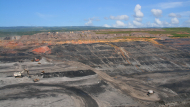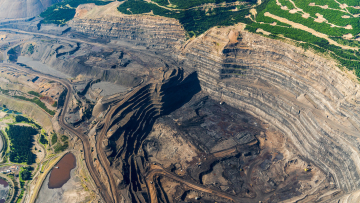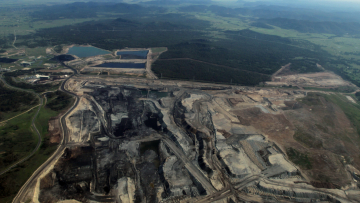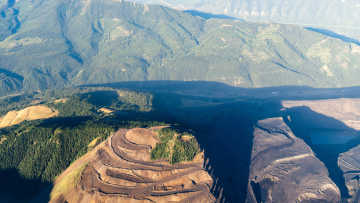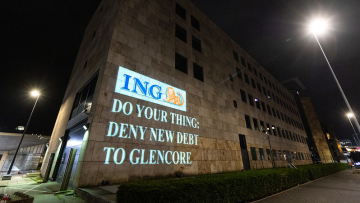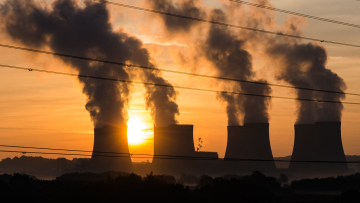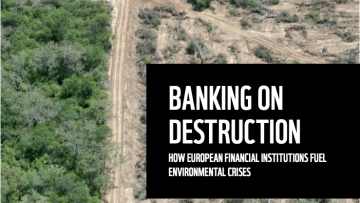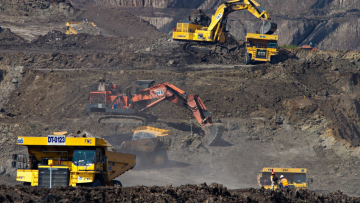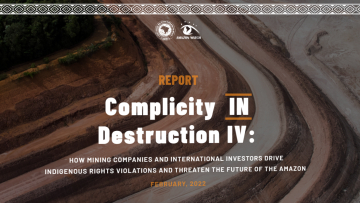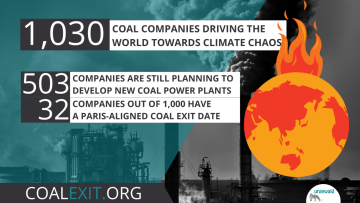
Company – On record
This profile is no longer actively maintained, with the information now possibly out of dateBankTrack
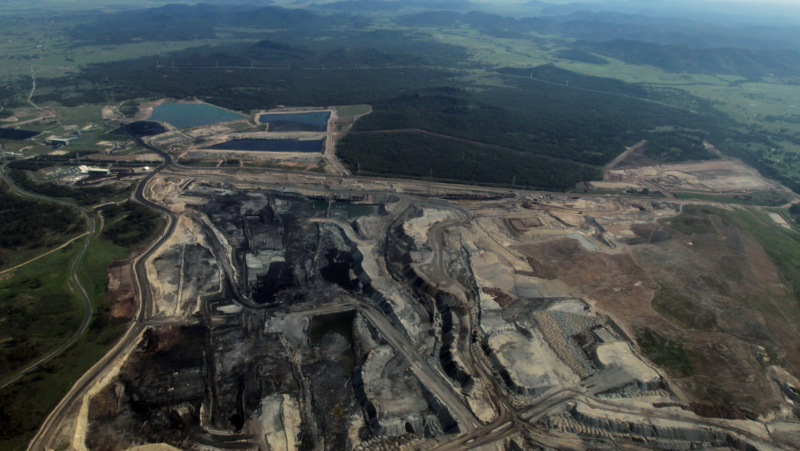
Company – On record
This profile is no longer actively maintained, with the information now possibly out of dateBankTrack
Why this profile?
Glencore is the 9th largest coal mine developer in the world. Despite claiming to be on a transition path, the company still plans to expand coal production by 45 million tonnes per annum.
The company has been widely criticised for its tax avoidance; poor health and safety conditions in many of its mines; its bad track record on environmental pollution; and for benefitting from child labour. Glencore has also been involved in numerous corruption allegations.
What must happen
Banks should require Glencore to immediately end the expansion of coal mining, and phase out existing coal acitivities on a 1.5C aligned timeline. Failure to do so should result in exclusion of all financing to the company. Banks must also refrain from providing any direct support for coal-related activities conducted by Glencore.
Banks must also make financing conditional upon strict adherence to indigenous and human rights by Glencore. This includes safeguarding the rights of indigenous communities affected by Glencore's operations and ensuring the right to Free Prior and Informed Consent is respected. Glencore must also take responsibility for the victims of its decades-long operations in Colombia.
| Sectors | Coal Mining , Oil and Gas Extraction |
| Headquarters |
|
| Ownership |
listed on London Stock Exchange
|
| Subsidiaries |
|
| Website | https://www.glencore.com/ |
Glencore plc is an Anglo-Swiss multinational commodity trading and mining company. The company was created through a merger of Glencore, which was founded in 1974 as a trading company, with the mining company Xstrata 2013.
Glencore produces and trades thermal and metallurgical coal, metals including copper, nickel and zink, minerals, crude oil and oil products, gas and agricultural commodities. It has production facilities in over 35 countries. In 2022, the company earned US$ 256 billion in revenue and employed more than 135,000 people.
According to the Global Coal Exit List, Glencore PLC derives 9% of revenue from coal. It produces 89.7 million metric tonnes of thermal coal annually, and has plans to expand coal mining in Australia and South Africa.
Impact on human rights and communities
Glencore has a long track record of links to human rights abuses, including violations of Indigenous rights, contributing to conflict-related displacement, and child labour. In fact, according to a report from Business & Human Rights Resource Centre, Glencore has the worst human rights record among miners of metals used in renewable energy.
Livelihoods & Indigenous peoples rights
The Cerrejon coal mine in Colombia, acquired by Glencore in 2022, has a long history of displacing and negatively impacting local communities; threatening their water supplies and causing malnutrition and dehydration via contaminated water and respiratory conditions, partially attributed to breathing air contaminated with coal dust. Poor working conditions at the mine have also frequently been reported, such as cheap labour, unhealthy working conditions and 12-hour shifts.
An OECD complaint was filed by Global Legal Action Network (GLAN) against Glencore over the project in 2021, alleging that the Cerrejón mine has displaced indigenous and Afro-Colombian communities without their free, prior, and informed consent and polluted the air and water in the vicinity of the mine.
The Tampakan Copper-Gold Project on the Philippine island of Mindanao was developed by a subsidiary of Xstrata Copper, which merged with Glencore in 2013. The project required 5,000 Indigenous people to be resettled, put community livelihoods at risk and threatened vital water sources. The company also reportedly funded military and paramilitary forces in several communities around the mine and is linked to at least three incidents of extra-judicial killings. In September 2022, the local government in the Philippines cancelled the permit for the project, citing concerns about the survival of hundreds of indigenous peoples. Mayor Leonard Escobillo told local press the permit had been revoked due the company’s “fraud, erroneous classification and misrepresentation of its business status.”
The Tintaya copper mine in Ecuador has been the subject of an ongoing dispute with the Peruvian community of Espinar since 2012. Community members alleged that the mine has contaminated local water and soil with heavy metals, which endangered their health and that of their animals. In 2017, research conducted by Amnesty International and a number of international and Peruvian NGOs found elevated levels of metals and toxic substances, including arsenic, manganese, cadmium, lead and mercury in blood and urine samples in 78% of trial volunteers. Peru's government sided with the company, labelling the protesters as extremists and facilitating the presence of police forces to suppress the protestors. Anti-mine protests in May and June 2012 resulted in three deaths and dozens of injuries. Later it was revealed that the company had signed an agreement with the Peruvian National Police (PNP) under which the PNP provided security and intelligence services to the company and operated a police station inside the mining camp. To this day, no one has been criminally charged for the massacre. The attempts to hold the responsible figures accountable in a court of law continues.
Working conditions
Glencore has been subject to many strikes because of poor working conditions. Amongst other allegations, the company has been accused by workers of violations of local labour law, excessive use of subcontractors and violations of health and safety regulations. Glencore has also been criticised for its handling of labour disputes: in response to strikes, the company has locked out workers, closed facilities and dismissed hundreds of workers.
In August 2012 in South Africa, Lonmin was involved in one of the most deadly police clashes since the end of apartheid, which came to be known as the Marikana Massacre. Glencore / Xstrata held a 24.9% stake in the company at the time. The South African Police Services used violence, killing 34 and wounding 78 people. The victims are still demanding justice.
Child labour
Before it was dismissed by a US court in 2021, Glencore had been at the centre of a legal case against several global tech companies in the United States over the “extreme abuse” of children mining cobalt in the Democratic Republic of the Congo. It is estimated that more than 35,000 children are working in cobalt mines in DRC. Recently, pictures surfaced in the media from the mining site Shabara, owned by Glencore, showing young children engaged in informal or “artisanal” mining.
In 2020, an investigation by Public Eye highlighted child labour taking place in the Porco mine in Bolivia, which is run by Sociedad Minera, a Glencore subsidiary.
Back in April 2012, an investigation by BBC Panorama shed light on bad practices at Glencore’s Bazano mine in the DRC, including dumping raw acid and profiting from children as young as 10 working 150 feet underground. The company denied the allegations despite strong evidence that Glencore receives copper indirectly from the Bazano mine.
Pollution & health impacts
Glencore’s operations have caused pollution and spill disasters all over the world with massive health effects as a consequence.
Cerrejon mine: In 2020, David Boyd, UN Special Rapporteur on human rights and the environment said that Colombia should suspend some operations at the Cerrejón mine because it has seriously damaged the environment and health of the country’s largest Indigenous community, and is making them more vulnerable to COVID-19.
Chad toxic water spill: In September 2018, a basin that was holding produced toxic water, a by-product of crude oil production, collapsed at Glencore’s Badila oilfield in southern Chad, causing eighty-five million litres of wastewater flooded agricultural fields before pouring into the local Nya Pende River. The incident left at least 50 local residents living near Glencore’s oil operations with serious health problems, many of those harmed were children, some of whom required hospitalisation.
More recently, on 21 July 2020, another spill occurred at the Badila oilfield from a waste oil sump, further contaminating the local environment and the river. An OECD complaint about these incidents was filed against Glencore UK in 2020. The investigation started in 2021 and is ongoing.
Kazakhstan wastewater spill: In 2016, it emerged that spilled wastewater from a mine operated by Kazzinc Ltd (majority-owned by Glencore) in Ridder, Kazakhstan has polluted the river Ulba, a tributary of the Irtysch, over a length of hundreds of kilometres, causing locals to have breathing difficulties as far as 700 metres from the river.
Peru Antamina Copper Mine: In June 2013, Antamina, in which Glencore owns a 33.75% stake, was fined US$77,000 for spilling 45 tons of toxic slurry into the neighbouring community at its copper mine in Peru. The spill caused extreme damage to the environment and poisoned around 350 residents, who consequently had complaints of nosebleeds, nausea, blurred vision and headaches. The company was also criticised for delaying in alerting authorities.
Impact on climate
Glencore is the 9th largest coal mine developer in the world, and despite claiming to be on a transition path, still plans to expand its coal production by 45 million tonnes per annum, with plans to expand production at mines in Australia and South Africa. In 2022 alone, Glencore produced 110 million tonnes of coal and 6.1 million barrels of oil equivalent. The Cerrejon coal mine alone has proven and probable reserves amounting to 255 million tonnes of thermal coal.
According to the company's annual report, its CO2 equivalent emissions in 2021 amount to 280 million tonnes. However, in 2022, The Australasian Centre for Corporate Responsibility (ACCR) published an analysis of Glencore’s methane emissions, estimating that the company has underreported its operational emissions by 11-24% between 2018 and 2021.
In 2011, an OECD complaint was lodged at the Australian National Contact Point by the Center for Human Rights and Environment (CEDHA) against Xstrata. The complaint concerned the expected severe environmental impacts on permafrost and glaciers in Argentina, in the area of the El Pachón and Filo Colorado projects. Xstrata denied the existence of any permafrost or glaciers in the area. The case was transferred to the Argentinian court system, where, unable to get the company to come to the table, the court issued a final statement in October 2014 lamenting the company’s refusal to engage in mediation.
Impact on nature and environment
Sukunka open-pit coal mine plant: In December 2022, The federal government of Canada blocked the development of Glencore's Sukunka open-pit metallurgical coal mine project, because of concerns raised as part of the project assessment about Southern Mountain Caribou and its critical habitat, grizzly bear mortality and the discharge of mercury and selenium.
The Cerrejon mine: Acquired by Glencore in 2022, this mine reportedly draws 2,700,000 litres of water from groundwater and from Rancheria River, causing droughts and water contamination.
Deforestation: According to a research by a non profit organisation CDP conducted in October 2020, Glencore Agriculture is one of three worst scoring companies in the world when it comes to the management of deforestation related to cattle and soy. According reports published in 2019 by Profundo and in 2022 by Planet Tracker, Glencore subsidiary Viterra is closely linked to deforestation in the Graco Chaco region of Argentina and Paraguay. The company is in the top 12 of exporters of soy from the region, which is leading to increasing deforestation to the extent that the region is now called ‘the next deforestation frontier’ after the Amazon.
Pollution from mining in DRC: In 2018, two Swiss non-governmental groups published a report highlighting Glencore’s continuing pollution of the air and soil around its open-pit copper and cobalt mines near the town of Kolwezi in the south of the Democratic Republic of the Congo (DRC) and highlighted the company’s insufficient due-diligence practices.
Other impacts
Corruption
In February 2023, Glencore was sued by the asset management company Legal & General over investor losses after Glencore admitted to multiple bribery offences in 2022.
In June 2022, Glencore’s UK subsidiary pleaded guilty to seven instances of bribery. The company was ordered to pay US$ 310.6 million to account for corruption across five African countries. Several months later, in December, Glencore paid another US$ 180 million to settle corruption claims in DRC.
Additionally, Glencore admitted to “engaging in a multi-year scheme to manipulate fuel prices at two of the busiest shipping ports in the United States,” a crime for which the company was fined US$ 341 million. In total, the company paid more than US$ 1 billion to settle criminal complaints in 2022.
In 2016, Glencore Energy UK Ltd. was convicted and fined for illegal oil bunkering (trading oil without the required government approval, essentially theft) in Nigeria.
In June 2011, The European Investment Bank suspended loans to Glencore over governance concerns, particularly in connection with allegations of tax evasion at Glencore's Mopani Copper mine in Zambia.
Between 2016 - 2022 banks financed Glencore and its subsidiaries via lending and underwriting totalling USD 18.307 billion, adjusted for Glencore's fossil fuel activities. See below for more details on banks involved.
DR Congo's faltering fight against illegal cobalt mines | AFP
The mining has been carrying on for years in flagrant violation of DRC laws and in defiance of the site's owner, a subsidiary of mining and commodities giant Glencore.
Why is Glencore a dirty word? | Mine & Energy Union
Find out about Glencore Xstrata's global operations and how they are attacking community standards in Collinsville, Queensland.
Forum Syd - the coal mine Cerrejón in Colombia
The coal mine Cerrejón in Colombia has caused environmental desctruction and violations of human rights for over 30 years.
How Big Coal Is Evicting Entire Villages In Colombia | AJ+
In La Guajira, Colombia, the Cerrejon massive open-pit coal mine has changed life for the indigenous people who live near it. But a group of Wayuu indigenous women is speaking out and organizing to try to stop the displacement of their villages.
Liberen al Arroyo Bruno/Free the Bruno River (Leobardo Sierra, comunidad Wayuú "El Rocío")
In this vídeo, Leobardo Sierra from El Rocio community, talks about the resistence against the Cerrejón mine and its illegal and unethical expansion into the Bruno river, upon which he and his community depends.
Colombia – The curse of coal | DW Documentary
2024
2024-08-07 00:00:00 | Glencore investors vote to keep coal assets
Glencore shareholders voted today to keep coal assets within the Glencore parent company, rather than spin them off. Following the completed acquisition of Elk Valley Resources - 4 metallurgical coal mines in Canada, Glencore is giving no indication that they will slow down their coal acquisitions.
"At the right price, in the right geography, in the right quantity, there's no reason why we wouldn't consider additional acquisitions of steelmaking coal." said Gary Nagle at the press conference today.
2024-02-08 00:00:00 | Glencore blocked from expanding McArthur River Mine port facility
A group of Northern Territory native title holders has won a landmark High Court battle blocking the expansion of an open cut mine on one of the world's largest zinc and lead deposits, about 900 kilometres southeast of Darwin. The McArthur River Mine has faced fierce opposition from traditional owners over the mine's effects on native title rights. But this decision is being seen as setting an important precedent that will be able to be applied by native title holders in future cases.
2023
2023-11-14 00:00:00 | Glencore acquires new metallurgical coal mines in Canada
A consortium of companies led by Glencore has bought Teck Resources steelmaking coal business for USD 9 billion. Glencore will get 77% of the business, while 20% will go to Japan's Nippon Steel Corporation. South Korea's POSCO will own 3%. The sale is expected to be completed in Q3 2024, if completed, it will make Glencore one of the largest metallurgical coal producers in the world.
2023-06-12 00:00:00 | Glencore makes offer for Teck's steelmaking coal business
Glencore has submitted a bid to Teck Resources to aqquire their steelmaking coal business. The proposal outlines a plan to combine the coal operations of Glencore and Teck to create what could be the world's largest metallurgical coal company. This move signals that Glencore is not planning to phase out coal production anytime soon.
2023-02-21 00:00:00 | Coal giant Glencore pushes for law change to prevent 'legal challenges' to carbon project
Leaked briefing notes revealed that Glencore has been lobbying in Australia against certain legislation changes, which could present “legal challenges to a controversial carbon capture and storage project in the Great Artesian Basin”.
2023-01-05 00:00:00 | Glencore investors demand clarity around thermal coal projects
Institutional investors from across the world representing US$ 2.2 trillion in assets co-filed a shareholder resolution pressuring Glencore to disclose how its projected thermal coal production and thermal coal capital expenditure aligns with the Paris Agreement’s goals and the International Energy Agency (IEA) Net Zero Emissions pathway.
2022
2022-01-11 00:00:00 | Glencore completes acquisition of Cerrejón
Glencore bought one of the largest open-pit mines in the world, the Cerrejon coal mine in Colombia.
2021
2021-10-19 00:00:00 | Dutch pension fund divests from Glencore over human rights concerns
Dutch pension fund ABP divested from Glencore due to concerns over human rights risks.
2020
2020-12-03 00:00:00 | Sintracarbón signs agreement with Cerrejón to end historic strike
Trade union members and workers of the Cerrejon mine finally reached an agreement with the company after two months of striking over pay rises, as well as health, education and living benefits.
2020-09-14 00:00:00 | Three NGOs file complaint with OECD against Glencore over environmental & human rights harms in Chad
An OECD Complaint was filed against Glencore UK over two toxic wastewater spills in Chad.
2019
2019-06-27 00:00:00 | DR Congo mine collapse death toll rises to 43
At least 43 artisanal miners were killed by a landslide at a copper and cobalt mine run by Glencore in Congo.
2016
2016-03-17 00:00:00 | Glencore says seven workers died after Congo mine-wall collapse last week
Katanga Mining, a majority-owned unit of global miner Glencore, said a collapsed wall at an open-pit mine in southeastern Democratic Republic of Congo had killed all seven people who were there at the time of the incident last week. The Swiss company, which has so far recovered three bodies from the site, said it had ended the search for the other four following a 10-day effort.
2016-02-04 00:00:00 | S&P downgrades Glencore to just above junk
Standard & Poor's has downgraded Glencore's debt to one notch above junk, citing the "challenging outlook" for the mining industry and increasing uncertainty about demand from China, the world's biggest consumer of raw materials.

